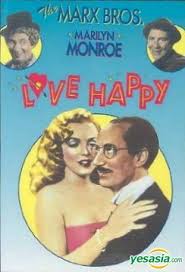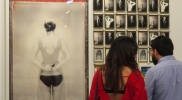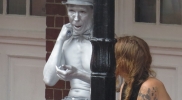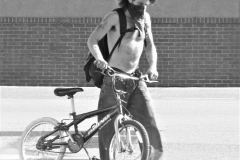|
|
Best Trivia - Cinematic
|
Favorite Trivia – CINEMA & STAGE
|
| “Clive Barker was promoting his movie ‘Hellraiser’ when a punk kid off the street cut open his own arm with a knife and asked Barker for an autograph in his blood. Clive obliged by dipping his pen in the blood dripping from the kid’s arm.”
Jeff Ayers, manager, Forbidden Planet (Footnotes From The World’s Greatest Bookstores – Bob Eckstein)
|
| amateur show: A way for people with no talent to prove it – Anonymous
Webster’s Unafraid Dictionary: Defiant Definitive Put-Downs – Leonard Louis Levinson
|
|
Fresnel lights (fray’nil) – glass lens with concentric ripples is adjustable from spotlight to flood light. (Invented for Lighthouses; focusable spotlight)
|
| “I was interested to find out from him [Walter Shenson] that Some Like it Hot (film with Monroe, Tony Curtis and Jack Lemmon) had been plagiarized. Billy Wilder, he said, had seen a bad German B-film in which two musicians, in order to get a job, had dressed in drag and taken jobs in a ladies’ orchestra. The film wasn’t well-known and it was easy to buy up all copies. Then they set about re-doing it. And one of the first things they had to settle was why the two men remained dressed as women. In the end they found the perfect solution by making them witness the St. Valentine’s Day Massacre in Chicago and, in order to escape from the gangsters, dress in drag.”
The Orton Diaries – Joe Orton
|
| “Life behind the scenes on a movie is a movie unto itself. . . A crew is a family. We are a traveling circus. There is always the most popular girl, the most popular boy, the class clown, the principal, and the one person whom everyone dislikes. He or she is identified early in pre-production and there is hardly ever a re-evaluation during the course of the film. We work mostly outside and we eat out of a truck. You can always spot us, because even though we think we look like everyone else, we don’t. Because we shop all over the world, we have a different color palette than the locals and we wear a uniform of t-shirts, shorts and sneakers all year round. Not many people wear shorts in the winter, but movie crews do. . .
“At the end of the film, everyone promises to stay in touch, and we all try. But chances are that very few of us will ever be on the same film again; instead, we will make other films and other friends – that is the nature of our world. Which is why, when the last take is shot and the last call to ‘check the gate,’ is heard, it can be difficult to say goodbye.”
Richard D. and Lili Zanuck – Producers, Coon and Planet of the Apes. (Seen Behind The Scene: Forty Years of Photographing on Set – Mary Ellen Mark)
|
| “dancing: “The poetry of the foot.” – Dryden
Webster’s Unafraid Dictionary: Defiant Definitive Put-Downs – Leonard Louis Levinson
|
| How Norma Jean Dougherty became Marilyn Monroe:
Ben Lyon, talent scout and casting director at Fox, “explained that Norma Jean Dougherty was not a name for a star and was hard to pronounce. After much discussion, Norma Jean and Lyon agreed to couple Glady’s [Norma Jean’s mother’s] maiden name, Monroe, with the first name of an actress Lyon had loved: Marilyn Miller.”
Marilyn Monroe: Hollywood Icon – Lisa Owings
|
| Hamlet: “A play about a man who couldn’t make up his mind.” – Anon
Webster’s Unafraid Dictionary: Defiant Definitive Put-Downs – Leonard Louis Levinson
|
| “A man tells his friend, ‘I went to the theatre with my wife last night but we couldn’t wait for the second half.’ ‘What happened?’ asks the friend
‘Well, said the man, ‘it said in the programme, Act Two: Two Weeks Later” |
| “Charlie Chapman invited Albert Einstein to ride with him to the world premiere of City Lights. Einstein was staggered by the klieg lights and the frenzy of the crowd, which was calling out the name not only of the movie star but also of his guest. The story goes that Chaplin turned to Einstein and said, ‘They are cheering me because they understand me; they are cheering you because they do not understand you.'”
Peter Lunenfeld – City at the Edge of Forever: Los Angeles Reimagined
|
| “Lunch at the Hard Rock Cafe with my friend H., the studio executive who monitors Miami Vice. . . . H. said, ‘I was down on the beach filming a scene with Don Johnson and there was this really pretty little extra. So Don says to her, ‘Hey, darlin’, how old are you?’ And she says, ‘Oooh, Mr. Johnson.’ So he says, ‘Darlin’, how’d you like to have something to tell to People magazine?’ ‘Wonderful.’
“‘The next day, Don comes up to me and asks me if the little extra might possibly have a few speaking lines. Help her get her SAG card. You have to admire that in Don.’
“‘What’s that?’
“‘He keeps his promises.'”
Hollywood Days, Hollywood Nights: The Diary of a Mad Screenwriter – Ben Stein
|
| “I’ve always felt toward the slightest scene—even if all I had to do in a scene was just to come in and say, ‘Hi,’ that the people ought to get their money’s worth and that this is an obligation of mine, to give them the best you can get from me.”
Marilyn Monroe speaking with Richard Meryman, Life Magazine, August 3, 1962
|
| “In March of 1968, Mirandi [Eve Babitz’s sister] and Clem [Floyd] opened a custom-leather boutique at 8804 Sunset Boulevard. They stuck two signs in the window: CLOSED and BY APPOINTMENT ONLY . . . They’d do private fittings, too, for Sharon Tate, in acting class with Yarnall, at the house Tate lived in with Roman Polanski.
“Says Mirandi, ‘Sharon was so beautiful. The house we went to was the one before the Cielo Drive house. Roman was there, and some kind of weird flirtation was going on between them and us. Clem was necking with Sharon. He would have loved the opportunity to get in her pants, but I was so repulsed by Roman that I couldn’t imagine any of it. I said to Clem, “We’re leaving. I never want to go back.”‘”
Lili Anolik – Hollywood’s Eve: Eve Babitz and the Secret History of L.A.
|
| “According to the call sheet, I have a 5 am pickup to be camera ready for an 8 am call to set. . . I know my driver is already waiting out there for me. Most teamsters arrive at least ten or twenty minutes early. . . A few words are exchanged. We’re fond of one another, but it is way too early for conversation. We’ll talk on the ride home, after we wrap. . . Those hundreds of early-morning drives to the set—dall in silence—dreamtime. That bridge between your own life and the one you were about to portray. The last moment of quiet and solitude before you arrived on the set.
“And then. Here we are. I step out of the car. An assistant director is waiting for me. He tells me hair and make-up is ready for me. (I already know that of course.) Wardrobe has a question about my second change and do I have time for a quick fitting before I go into the works? The dialect coach is available whenever I have fifteen minutes. The director has some ideas about today’s scenes that he’d like to go over with me. The writer would like to show me the changes he has made and the new pages. The producers would love to have a few words with me about yesterday’s dailies. And do I want to order breakfast now or wait awhile? The caterer wants me to know that all the fruit today is organic.”
Jessica Lange – Actress, Tootsie (Seen Behind The Scene: Forty Years of Photographing on Set – Mary Ellen Mark)
|
| “You know what’s fascinating is that Hollywood’s still filled with all these delicate ladies who look like they were beauties, all glued up and in their cars, driving around. Not with drivers, just driving themselves. And you wonder what they used to do, what star they were, what roles they had. Everybody reminds me of Jane Wyatt out there. Those skinny, petite beauties who wear turbans and they’re at premieres and things. And they’re like eighty years old. How do these ladies live? I mean, if they were contract players they didn’t make much. I guess one of their husbands must have been rich. But wasn’t that before community settlement? But I guess you don’t need much to live. Like you don’t pay rent if you have your own house. And food, well, you can eat at McDonald’s or there’s always some fairy fan who’ll take you around.”
The Andy Warhol Diaries (Jan. 2, 1985) – Andy Warhol
|
| “I just knew I could make it. I would take home photographs of myself to study how I looked and if I could improve myself posing in front of a mirror for hours. The next day I would see the photographer . . . and ask, ‘What did I do wrong in this photo?’ or ‘Why didn’t this photo come out better?’ When they told me, I would never make that mistake again. I believed in myself. I just had to make it. I was determined to make it. Nothing was going to get in my way.”
Marilyn Monroe (Marilyn Monroe: Hollywood Icon – Lisa Owings)
|
| “STANISLAVSKI, KONSTANTIN: The interpretation of Stanislavski’s methods, practiced in America, is concentrated mainly on one aspect of his teachings, and the main aim is concentrated more on the approach the actor has to the part than the final performance. Any ideas I might have had about the importance of the actor’s approach to a part were extinguished for good when Max Reinhardt, sitting in the empty theatre, listened to my prayer of Gretchen in Faust. When I got up from my knees embarrassingly brushing off the dust from my skirt, his voice rang out: ‘You did not make me cry.’ I lifted my tearstained face and said; ‘But Professor, I am crying!’ The answer was: ‘I do not care if you cry or laugh or what emotion you harbor, your task is to make me cry, me, the spectator. I couldn’t care less what you feel! Make me feel!'”
Marlene Dietrich’s ABC
|
| “Oscar is the most beloved and respected man in Hollywood. . . and most importantly, he has no penis. He is literally a statue of limitations.”
Jimmy Kimmel, 90th Academy Awards (2018) opening monologue
|
| “Sometimes wearing a scarf and a polo coat and no make-up and with a certain attitude of walking, I go shopping—or just looking at people living. But then you know, there will be a few teenagers who are kind of sharp and they’ll say, ‘Hey, just a minute—you know who I think that is?’ And then they’ll start tailing me. And I don’t mind. I realize some people want to see if you’re real. The teenagers, the little kids, their faces light up—they say ‘gee’ and they can’t wait to tell their friends. And old people come up and say ‘Wait till I tell my wife.’ You’ve changed their whole day.”
Marilyn Monroe speaking with Richard Meryman, Life Magazine, August 3, 1962
|
| “The Oscar statuette stands 13.5 inches tall and weighs 8.5 pounds. The Oscar got its nickname from onetime Academy librarian Margaret Herrick, who remarked in 1931 upon seeing a statuette, ‘Why it looks like my Uncle Oscar!”
Mara Reinstein, Parade, February 25, 2018
|
|
“I am most interested in acting now, and my ambition is to audition again and again until I get a part in one of the big plays. There is a companionship and fervor in producing a play which is equaled by nothing else: by the opening night, one feels a great rapport with everybody from the leading man to the electrical and wardrobe mistress!.” [October 29, 1955]
Sylvia Plath – Letters Home: Correspondence 1950-1963, ed. by Aurelia Schober Plath
|
| “. . . I continue to prepare for an upcoming shoot I’m producing . . . Art direction is a very important element of production, yet it is often overlooked. The production designer and his or her team work closely with the director and the director of photography (DOP) to create the overall look of the film. From the color of the walls to the contents of a cookie jar, the art department designs everything that one sees on the screen. . . In keeping with the theme of the 1970’s, we had to find a city bus to match that look . . . I create my call sheets and send them out to the cast and crew via email . . call sheets tell the actors, crewmembers and extras exactly where they need to be at what time, and also which scene or scenes we’re shooting that day . . . Our director sends me an email to apologize for the delay in sending me the shot list . . . A director creates a shot list to enumerate everything we plan to film. It lets the crew know what will be required on the shoot. It’s a vital part of helping us schedule our day.” [January 10, 2008]
Career Diary of a Movie Producer – Robin Hays
|
| “Actor Peter Sellers, in the middle of a row with his third wife, Miranda Quarry, over the correct way to pass the port, let off steam by releasing all her pet birds from their cages and hitting them around the room with a tennis racquet.”:
Ninety-Nine Glimpses of Princess Margaret – Craig Brown
|
| “In 1985, eager to work on my first film set, I scored a job as a location production assistant on Brighton Beach Memoirs. With enthusiasm brimming, I reported to Brighton, Queens, where I received my first assignment: to cajole the neighbors in the homes near the set to allow us to remove their television antennae from their roofs so the location appeared in keeping with the period of the film—1930s. I was to offer to install rabbit-ear antennas inside their homes instead; they complained, but most of them acquiesced. Then, filming began! For my second assignment, I was to wander the blocks surrounding our location waiting to hear dogs barking, and then race to quiet them. My pockets were always overflowing with dog biscuits to assist me in my task.”
Richard N. Gladstein – Producer, The Cider House Rules (Seen Behind The Scene: Forty Years of Photographing on Set – Mary Ellen Mark)
|
| “Fame to me certainly is only a temporary and a partial happiness—even for a waif and I was brought up a waif. But fame is not really for a daily diet, that’s not what fulfills you. It warms you a bit but the warming is temporary. It’s like caviar, you know—it’s good to have caviar but not when you have to have it every meal and every day. I was never used to being happy so that wasn’t something I ever took for granted. . . I was brought up differently from the average American child because the average child is brought up expecting to be happy—that’s it, successful, happy, and on time. Yet because of fame I was able to meet and marry two of the nicest men I’d ever met up to that time.”
Marilyn Monroe speaking with Richard Meryman, Life Magazine, August 3, 1962
|
| “As I stood at the bar of Jimmy’s, I talked with passion . . . Suddenly, hearing myself repeat lines I’d used in other places, I began to feel oddly detached. I was there; but I was also looking at myself being there. Part of this eerie feeling came from living with Shirley [MacLaine]. From her, I had learned much about the way actors worked, the mechanisms they used to become other people, the small signs and tags that they offered to display emotions they might not feel. That night, for the first time, I began to feel that I was performing my life instead of living it.”
A Drinking Life – Pete Hamill
|
|

“Someone I met at a lunch counter told me they were making retakes on a movie called Love Happy and needed a girl for a bit part. Harpo and Groucho Marx were in the movie.
I went on the set and found the producer Lester Cowan in charge. He was a small man with dark, sad eyes. He introduced me to Groucho and Harpo Marx. It was like meeting familiar characters out of Mother Goose. There they were with the same happy, crazy look I had seen on the screen. They both smiled at me as if I were a piece of French Pastry.
‘This is the young lady for the office bit,’ said Mr. Cowan.
Groucho stared thoughtfully at me. ‘Can you walk?’ he demanded.
I nodded.
‘I am not referring to the type of walking my Tante Zippa has mastered,’ said Groucho. ‘This role calls for a young lady who can walk by me in such a manner to arouse my elderly libido and cause smoke to issue from my ears.’
Harpo honked a horn at the end of his cane and grinned at me.
I walked the way Groucho wanted.
‘Exceedingly well done,’ he beamed.
Harpo’s horn honked three times, and he stuck his fingers in his mouth and blew a piercing whistle.
‘Walk again,’ said Mr. Cowan.
I walked up and down in front of the three men. They stood grinning.
‘It’s Mae West, Theda Bara, and Bo Peep all rolled into one,’ said Groucho. ‘We shoot the scene tomorrow morning. Come early.’
‘And don’t do any walking in any unpoliced areas,’ said Harpo.”
Marilyn Monroe (with Ben Hecht) – My Story
|
| “. . . [John Goodman] found fame portraying Dan Connor, Roseanne’s poker-and-guitar playing helpmate on her hit blue-collar sitcom. ‘People are starting to put my face with my name,’ marveled the self-deprecating new star, ‘instead of thinking I’m either somebody they went to high school with or did time with.'”
People Weekly: Favorite Pictures, 2000
|
PCP-laced chowder on set of Titanic:
“December 19, 2017 marked the 20th anniversary of the Titanic’s theatrical release, and as part of that celebration, the tale of more than 50 stars and production crew members getting high on PCP re-emerged. On the night of August 8, 1996, Titanic stars Bill Paxton and Suzy Amis, director Cameron and more than 60 other crew members were in the midst of wrapping a scene when they were suddenly overcome with the need to vomit, laugh and cry.
Speaking to Vanity Fair in 2009, Cameron recalled that after feeling ‘suddenly and very distinctly woozy,’ he stepped off set to vomit. When he got back, no one was there because they too had been physically overcome. Eventually, everyone made their way to a local hospital where they reportedly bounced off the walls—moaning, leading conga lines, collapsing and racing around in wheelchairs. The hospital staff and even Cameron believed they had come in contact with paralytic shellfish neurotoxin and were experiencing food poisoning, but a toxicology report from the Halifax Police Department revealed the truth: everyone was high on PCP.
Further investigation uncovered that someone had laced the chowder, which was provided by a local catering company as part of the crew’s lunch spread. . . Several parties were questioned, but no one was charged, and the case was eventually closed in 1999.
Cameron believes it was a disgruntled production member who had recently been let go. ‘We had fired a crew member the day before because they were creating trouble with the caterers,’ he told Vanity Fair. ‘So we believe the poisoning was this idiot’s plan to get back at the caterers, whom of course we promptly fired the next day. So it worked.'”
Food & Wine – Abbey White
|
“Trent and I get together to discuss Darklands. . . The video effects company we’re using is eager to get a list of the VFX [visual effects] shots we need. . . But no matter how excited anyone might be, we can’t provide a list of the shots until we have picture lock. Our composer can’t proceed until we reach that point as well. Film editing involves many stages. First comes rough cut, where you place everything in the timeline. Then there is assembly cut, which cleans up the rough cut. Finally there is picture lock, which indicates you plan to make no further changes to your edit. . . Trent mentions an independent filmmaker who fielded an offer of $150,000 from a distribution company for his film, but was advised to wait until the American Film Market (AFM) to entertain additional bids. This annual event is the place where films are bought and sold. The director took this advice and, by biding his time, he managed to sell his film for $1.5 million.” [January 16, 2008]
Career Diary of a Movie Producer – Robin Hays
|
“The essence of Hollywood is . . . the launching pad to the realms of anything can happen . . . a layer of possibility that the little thought I had while I was getting my car washed can and will wind up on a silver screen sixty feet wide by forty feet high hangs over the concrete facts of the day like the haze which overlays the city in June. That haze seeps into every detail, into every pore of the actual, so that the trip to the grocery store can be the start of a story that will be a script and will make me rich beyond avarice, and express a basic truth that people need to know. . . It does not matter that the dream is so rarely—if ever—made actual. The point is that the dream is always there, mixing seamlessly with the real, so that no one truly in the business knows where the fact ends and the fantasy begins. That is the glory of Los Angeles life—the ineluctable mingling of what is and what could be if life were a dream.” [April 11, 1986]
Hollywood Days, Hollywood Nights: The Diary of a Mad Screenwriter – Ben Stein
|
“If you ran into Sarah Paulson at Whole Foods . . . you likely wouldn’t recognize her straightway—and not because she isn’t striking or famous (she’s both) . . . You wouldn’t recognize Paulson because when she’s working, she can’t bear to look like herself. ‘The more I can look in the mirror and not recognize myself, the more excited I am,’ she says. . .
“‘We’re constantly faced with all these ideas of beauty—things that Hollywood puts out there for us to gobble up,’ Paulson says. ‘It’s very powerful when I look in the mirror and the first thing I’m thinking isn’t, “Are you pretty? Are you going to appeal to someone?” I can work much more freely when I don’t have to concern myself with my looks.'”
Hannah Morrill, Angeleno Magazine (Modern Luxury), June 2018
|
“Even in later years she [Gloria Swanson] relied on the power of stardom to do what she wanted. If she was attending an important function or even going to see a movie she would have someone call ahead. ‘Tell them I’m coming. What good is a name if you can’t use it?’ And of course there would be an official waiting at the curb to greet her when she alighted from her limousine.”
Annette Tapert – The Power of Glamour
|
“She [Gloria Swanson] still thought of herself as a femme fatale [77 years old], and her heart was still young and easily fooled. She fell prey to the charms of Brian Degas, a good-looking man forty years her junior. . . ‘She fell for Degas hook, line and sinker,’ says Raymond Daum. ‘She was like a young girl. She would sit on his lap and cuddle and coo and say to me, “Look at that boy, he could play a leading man.” The whole situation was like a parallel to Norma Desmond, except in this case Degas made the schemer Joe Gillis in Sunset Boulevard look like an angel.’
“Daum discovered that Degas was bilking Swanson of almost all of the modest fortune she had left and had stolen valuable personal mementos and relevant documents relating to her career. But Swanson refused to believe Daum or her family when they came to New York to deal with the problem. . . By 1982, Daum remembers, she was so broke that all but one of several telephone lines had been taken out of her apartment because she couldn’t pay the bills. A few months before she died of a stroke in April 1983, the bubble burst when two producers who’d been negotiating with Degas for Swanson to star in a Broadway show taped their conversations with him in which he spoke disparagingly of her. ‘When they played the tapes for Gloria, she finally realized she’d been betrayed, and it broke her heart,’ says Daum. ‘I’m convinced this fueled her death.'”
Annette Tapert – The Power of Glamour
|
“‘I knew many of the stories that Christina told in that book firsthand [Mommie Dearest],’ says costume designer Nolan Miller, who became a friend of Crawford’s in the early 1950’s. ‘Christina had her own ax to grind She did get punished a lot. She was a very strong-willed child. I used to see Joan tell her to do something and she would flatly refuse. As a result they locked horns early. All that frustration came out in the book. At the end of Joan’s life, she and Christina weren’t speaking. And when Joan didn’t include her in her will, Christina wrote the book as a retaliation.'”
Annette Tapert – The Power of Glamour
|
“To launch the first national bond drive for the war effort, Roosevelt’s advisers felt that a movie star would be the obvious choice to kick off the campaign. Who better than the sexiest man in Hollywood to do the job? But [Clark] Gable refused because he hated crowds, and personal appearances made him uncomfortable. Lombard tried to exercise her influence on him. . . Gable nominated his wife for the job. . .
“Despite the freezing temperatures, Lombard attracted crowds everywhere she went, from Salt Lake City to Chicago. On the morning of January 15, 1942, in Indianapolis, three thousand people lined up inside the statehouse rotunda to buy bonds from her. . . At the end of the evening it was announced that Lombard had sold $2 million worth of bonds. . . She was thrilled, but she wanted to get back home to Gable as quickly as possible. The patriotic euphoria of the trip had not alleviated her reservations about leaving him alone; during their three-year marriage the two had never been apart for more than a day. He had just begun filming Somewhere I’ll Find You with Lana Turner, who had been his costar on his previous film, Honky Tonk. Rumors had circulated that there had been a mutual attraction between them, and Lombard had made sure she spent time on the set to monitor the situation. . .
“All these worries prompted Lombard to cancel some promotional stops she was to make on her train ride back west. Instead, she booked a 4:00 A.M. flight out of Indianapolis. Her mother, who had accompanied her on the tour, begged her to stick with the original plan. Bess Peters had never flown and feared it She also did a numerology reading that predicted an unsafe journey. Lombard, who usually followed her mother’s psychic advice, ignored it this time and persuaded her mother to board the plane.
“If Lombard had thought about it, she might have intuited that the trip seemed doomed from the start. She had trouble getting the reservations. It was a multi-stop flight, and in Albuquerque civilians were bumped off the flight to accommodate several pilots with military orders. Lombard refused to give up her seat on the grounds that she had served her country by selling bonds. The airline let her and her entourage remain on board. The next stop would have been Las Vegas, but the plane crashed into a mountain about 15 miles from the airport, killing everyone on board.”
Annette Tapert – The Power of Glamour
|
“Within a year she [Dolores Del Rio] had won the first of four Ariel Awards, the Mexican equivalent of the Oscar. She went on to become the most celebrated actress of the Mexican cinema for the next two decades. Proof of that stardom was supremely evident in one incident that occurred in Buenos Aires during the filming of a Spanish version of Lady Windermere’s Fan in 1947. Evita Perón invited Del Rio to tea, but Del Rio declined because of her filming schedule. The next day the government issued an order that the film industry was to shut down completely so Del Rio could have tea with Mrs. Perón.”
Annette Tapert – The Power of Glamour
|
“Noël Coward wrote in his diary that he found her [Claudette Colbert] ‘extremely tiresome’ during the filming of a live telecast of Blithe Spirit (1956). ‘All this is a pity because she is, within her limits, an excellent actress and those limits she imposes on herself. I have for years had a definite affection for her as a person, but these rehearsals are wilting it considerably. So exasperated was Coward that at one point he said, ‘Claudette, if you had a neck, I’d wring it.'”
Annette Tapert – The Power of Glamour
|
“In 1950 she [Claudette Colbert] received critical acclaim for her dramatic performance as an American woman in a Japanese prison camp in Three Came Home. Though it was an excellent film, it cost her a role that would have been as pivotal as It Happened One Night. She had refused to allow a stuntwoman to perform a fight scene in Three Came Home. That stunt ruptured a disk and put her in traction just before she was to begin shooting All About Eve. The part of sharp-witted Margo Channing had been written with Colbert in mind—but the character was immortalized by Bette Davis. Colbert forever mourned the loss of that role. That disappointment also signaled the end of two decades of stardom. ‘I was no longer young—I was forty-seven—and people thought that because I was not able to work in that marvelous picture I was sick,’ she told writer Gerald Clarke.”
Annette Tapert – The Power of Glamour
|
“He [playwright Philip Barry] presented her [Katherine Hepburn] with a half-finished comedy he’d written specifically for her. . . The character was Tracy Lord; the play, The Philadelphia Story. . . Sensing that this was the vehicle to relaunch her Hollywood career, she followed the advice of Howard Hughes, who was then her boyfriend, to purchase the film rights before taking the play to Broadway (Hughes actually bought them for her) so that, when Hollywood stepped in, the studio couldn’t detach her from the project.”
Annette Tapert – The Power of Glamour
|
“In 1936, she [Marlene Dietrich] found she had an ardent fan in the form of Adolf Hitler, whose favorite film was reportedly The Blue Angel. He sent word that he wanted her to return to Germany to become the queen of the Third Reich cinema at an astronomical salary. Dietrich declined for she saw Nazism ‘bringing out the inhumanity that resides in Germans.’ Instead, she pledged her allegiance to America and became a citizen in 1937.”
Annette Tapert – The Power of Glamour
|
Manager:
“I want to please the crowd we get,
Because it lives and lets us live; each seat
Is ready, our booth is up, the stage is set,
And everyone is waiting for a treat.
Already in their places with eyebrows raised,
They sit composed and want to be amazed.
The public I know how to interest,
But into such a fix I’ve ne’er been led;
It’s true they’re not accustomed to the best,
Yet what a frightful lot they’ve read!
How shall we ever make things fresh and new,
Contain a meaning, yet be pleasing too?. . .
“Just look about—whom are you writing for?
While this one comes as bored as bored can be,
Another comes who dined too heavily. . .
“Study your patrons well, draw near,
Half are indifferent, half are rude!
One wants a game of cards after the play,
One in the arms of a wench, a wanton night. . .”
Faust (“The Prologue in the Theatre”) – Goethe, trans. Alice Raphael
|
“Saturday night I was greatly exhilarated by the Fire Sequence. It was one of the biggest thrills I have had out of making pictures—first, because of the scene itself, and second, because of the frightening but exciting knowledge that Gone With The Wind was finally in work. Myron rolled in just exactly too late, arriving about a minute and a half after the last building had fallen and burned and after the shots were completed. With him were Larry Olivier and Vivien Leigh.
“Shhhhh: she’s the Scarlett dark horse, and looks damned good. (Not for anybody’s ears but your own: it’s narrowed down to Paulette, Jean Arthur, Joan Bennett, and Vivien Leigh. We’re making final tests this week, and I do frantically hope that you’ll be home in time to sit in on the final decision. . . ” [December 12, 1938]
David O. Selznick, to his wife (Dear Los Angeles: The City in Diaries and Letters: 1542 to 2018, ed. by David Kipen)
|
“I have always liked show people. their roving lives keep them broadminded and I like them for their talents. Often we’d all—sometimes the whole twenty or thirty troupers—congregate after the show in some restaurant (they have private back rooms with pianos in them in those days) and give an impromptu show, just for ourselves, late at night after theaters were closed. . . I remember one girl all in spangles with a tambourine. I have forgotten her name, but she was the very spirit of joy. We had a good party when she married the strong man. A regular Delilah. . .
“When Ben and I left the circuits, we had to get up our own shows. Publicity wasn’t the art then it is now. We had good luck working up dances. We’d get in a little town and look up the usually good-looking soda water clerk in the main drugstore. He would be able to start the grapevine network buzzing in the village, and the dances usually paid our way—as far as another burg. Ben and I worked up different little towns in this manner and saw much of the U.S.A. Sometimes my fingers were so sore from long hours of playing that to touch the sheets of a welcome bed made me want to yelp like a puppy.”
Maude Parrish – Nine Pounds of Luggage
|
“Says [Michelle] Phillips, ‘I didn’t even know Harrison [Ford] was an actor. I remember getting dragged to Star Wars at ten a.m. on a Saturday morning by my stepbrother, who’d done some animation for the movie. I was sitting there, watching the screen, and all of a sudden Harrison comes on and I gasped and said, “That’s my pot dealer!”
“Says Eve, ‘Harrison carried his dope in a base fiddle case, which he brought to Barney’s.’ Ford was supplementing his dealing with a little carpentry. Though, in Eve’s opinion, he should’ve stuck to dealing: ‘I don’t think Harrison knew anything about architecture or engineering or anything like that. He built a deck for Joan [Didion] and John [Gregory Dunne], and John almost killed him because he never finished it.’ . . . The thing about carpenters, though, is they really know how to nail it. Says Eve, ‘Harrison could fuck. Nine people a day. It’s a talent, loving nine people in one day. Warren [Beatty] could only do six.'”
Lili Anolik – Hollywood’s Eve: Eve Babitz and the Secret History of L.A.
|
“All my stories are cinematic. The Illustrated Man over at Warner Brothers a couple of years ago (1969) didn’t work because they didn’t read the short stories. I may be the most cinematic novelist in the country today. All of my short stories can be shot right off the page. Each paragraph is a shot. . .
“The job is to pick and choose among all metaphors in the book, put them into a screenplay in just the right proportion where people don’t start to laugh at you. For instance, I saw The Only Game in Town, George Stevens’ film about gambling in Las Vegas, on TV recently. Warren Beatty and Elizabeth Taylor, who is a little bit Porky Pig. About a half hour in, Taylor turns to Beatty and she says, ‘Carry me into the bedroom.’ Well, there’s no way to do anything but laugh. I thought, ‘He’s going to throw his back out.’ I mean there goes your film. ”
Ray Bradbury – Zen in the Art of Writing
|

Comments are closed.
|
|



























































